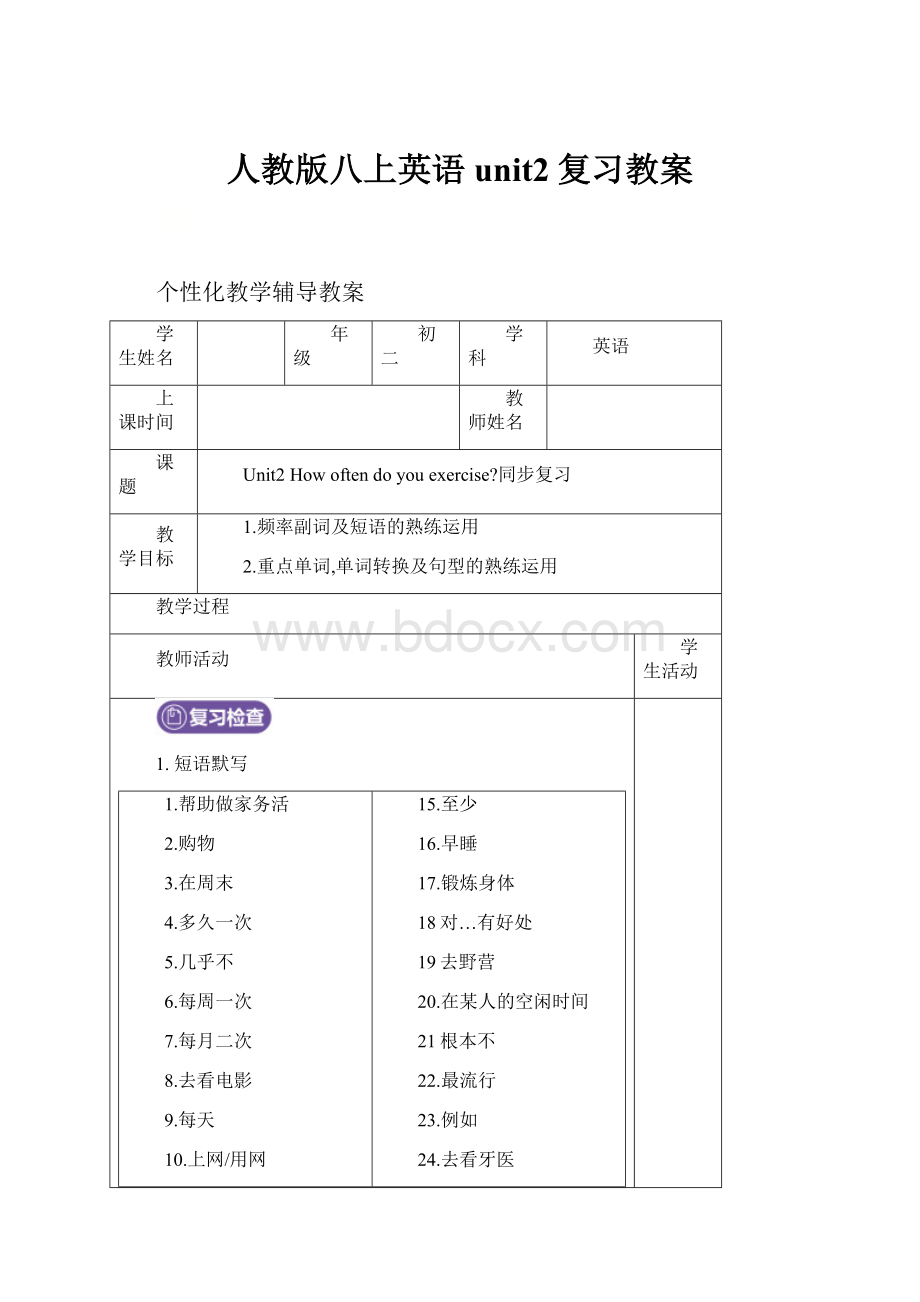人教版八上英语unit2复习教案.docx
《人教版八上英语unit2复习教案.docx》由会员分享,可在线阅读,更多相关《人教版八上英语unit2复习教案.docx(17页珍藏版)》请在冰豆网上搜索。

人教版八上英语unit2复习教案
个性化教学辅导教案
学生姓名
年级
初二
学科
英语
上课时间
教师姓名
课题
Unit2Howoftendoyouexercise?
同步复习
教学目标
1.频率副词及短语的熟练运用
2.重点单词,单词转换及句型的熟练运用
教学过程
教师活动
学生活动
1.短语默写
1.帮助做家务活
2.购物
3.在周末
4.多久一次
5.几乎不
6.每周一次
7.每月二次
8.去看电影
9.每天
10.上网/用网
11.有空
12.上舞蹈钢琴课
13.打网球
14.熬夜
15.至少
16.早睡
17.锻炼身体
18对…有好处
19去野营
20.在某人的空闲时间
21根本不
22.最流行
23.例如
24.去看牙医
25.超过/多于
26.旧习惯难改
27.困难的
28少于/不到
Part1知识点精析
1
How_______doyougotothemovies?
—Onceamonth.
often
【语境激活】Howoftendoyouexercise?
你(你们)多久锻炼一次身体?
p9
【解析1】howoften表示“多久一次”,是对动作的频率进行提问,一般与一般现在时连用。
其回答通常有:
频度副词:
always,usually,often,sometimes,hardlyever,never
次数+时间段:
如:
onceortwiceaweek,threetimesamonth
every+时间段:
everyday(每天)区别:
everyday(每天的;日常的)
注意:
表示“一次或两次”时,一般用once和twice表示。
如:
onceamonth(一个月一次)
而表示“三次或以上”时,则用“数词+times”结构。
如:
fivetimesayear(一年五次)
【解析2】exercise(v/n)的用法
1)(动):
锻炼.如:
Heexerciseseveryday.
2)(可数名词):
“...操;练习”.如:
domorning/eyeexercises;domathexercises
(不可数名词):
“锻炼;运动”讲:
如:
Weoftendo/takeexerciseonweekends.
【拓展】
词语
词义
用法
答语特征
howlong
多久
询问时间多久
for/about+一段时间
howoften
多久一次
询问动作的频率
often,twiceaweek等
howsoon
多快,过多久
询问时间多快
in+一段时间
howfar
多远
询问距离多远
tenminutes'walk
howmany
多少
询问可数名词数量
数词+可数名词复数
howmuch
多少
询问不可数名词数量
数词+表示量的词+不可数名词
多少钱
询问价格
数词+钱
1.()—Howoftendoesyourmothershop?
—_____.
A.OnceaweekB.ThreetimesC.fiveandsixtimesaweekD.Foraweek
2“Howoftendoeshegoshopping?
”“Hegoesshopping___________________.”(每月一次)
3.Walkingis____________.散步是很好的运动。
.1.A2.onceamonth3.goodexercise
2
1.What_____theyusuallydoonweekends?
2.What______sheusuallydoonweekends?
3.What______he______onweekends?
1do2.does3.does,do
【语境激活】1.“Whatdoyouusuallydoonweekends?
”“Ioftengotothemovies.”
“周末你通常做什么?
”“我通常去看电影。
”
【解析1】该句是由what引导的特殊疑问句。
前一个do为助动词,本身无实际意义,用于构成疑问句结构;后一个do为实义动词,意为“做,干”,是该句的谓语。
助动词do要随人称、时态等作相应的变化。
eg:
WhatdoesshedoonSundays?
她星期六通常做什么?
【解析2】weekend名词,意为“周末(星期六和星期日)”。
onweekends固定短语,意为“在周末”,也可说成atweekends。
1、你父亲周末经常做什么?
What_______yourfatherusually_______________________?
2、Whatdoesshedoonweekends?
—_______________________________________(她有时去购物)
1.does,doonweekends2.Shesometimesgoesshopping.
3
1.Areyou______now?
你现在有空吗?
2.我很忙Iamquite________
freefull/busy
【语境激活】Areyoufreenextweek?
你下周有空吗?
P10
【解析】free意为“空闲的,有空的”,反义词busy。
befree意为“闲着,有空”eg:
:
Heisfreenow.他现在有空。
拓展:
free还可译为“免费的”eg:
Theticketsarefree.票是免费的。
【语境激活】...nextweekisquitefullforme...…下周对我来说相当忙…p10
quitefull很忙,相当忙.
拓展:
①full还可译为“满的,充满的”。
常用于短语befullof中,意为“充满……”。
eg:
Thebagisfullofclothes.那个包里装满了衣服。
②full还可译为“饱的”。
其反义词为hungry。
eg:
Ican'teatanymore,Iamquitefull.我不能再吃了,我相当饱了。
1.你今晚有空吗?
_____________________________________.
2.Hehada_______life他过着充实的生活
3.Thebookcaseis_____(充满)ofkindsofbooks.
Areyoufreetonight?
full,full
4
1.Doingmorningexercises___yourhealth.A.isbadto B.isgoodforC.isbadfor D.isgoodto
B
【语境激活】Shesaysit'sgoodformyhealth.她说那对我的健康有益。
P12
【解析】begoodfor...表示“对……有益(有好处)”;其反义为:
bebadfor...
(这里for 是介词,后跟名词、代词或动名词)
(1)begoodat+doing:
“擅长于……”如:
Heisgoodatplayingfootball.
(2)begoodwith:
“与……相处好”如:
Theteacherisgoodwithhisstudents.
(3)begoodtosb./sth=befriendly/kindto:
“对……好”如:
Theoldwomanisgoodtous.
1______________________todomorereading. 多读书对我们有好处。
2.Iamgoodatplay)basketball.
1.It'sgoodforus2.playing
5
Shewantsme__________shoppingwithher.她想让我和她一起去购物
togo
【语境激活】Momwantsmetodrinkmilk.妈妈要我喝牛奶。
P12
【解析】wantsb.todosth.意为“想让某人做某事”
拓展:
1.wantsth.想要某物Doyouwantanystorybooks?
你想要些故事书吗?
2.wanttodosth.想要做某事Iwanttovisitmyuncle.我想去看望我的叔叔。
注意:
有很多动词后面用这种结构做动词的复合宾语,如:
asksb.todosth. 叫某人做某事
tellsb.todosth. 告诉某人去做某事
helpsb.(to)dosth. 帮助某人做某事
1.Doyouwant(tell)meanything?
2.Theteacher__________________________eathamburgers.老师不想让我们吃汉堡包。
1.totell2.doesn'twantusto
6
1Weaskedourstudents______theiropinions.
1.about
【语境激活】Lastmonthweaskedourstudentsabouttheirfreetimeactivities.上个月我们向学生询问了他们业余活动的情况。
P13
【解析】asksb.aboutsth.:
询问某人关于某事
asksb.todo:
叫…做某事Teacheraskedmetocleantheclassroom.
asksb.nottodosth.:
叫…不要做某事
asksb.forsth.:
向某人要求…如:
askteacherforhelp
翻译
1.向某人寻求建议asksb___________
2.Iaskedmyteacherabouttoday'shomework.____________________________________。
3.他要求我站起来Heaskedme_______________.
foradvice,我问老师今天的作业,tostandup
7
1.Here_______thebus公交车来了
comes
【语境激活】Herearetheresults.这是(调查)结果。
P13
【解析】该句是一个倒装句,用来表示强调。
句子以here,there等副词开头,动词为be,come,go,run等词时,常用这种句式。
当主语是名词性短语时,要用全倒装,即“here+谓语+主语”;当主语是人称代词时,要用半倒装,即“here+主语+谓语”。
eg:
Herecomestheteacher.老师来了。
Hereyouare.给你。
1这是你的夹克Here_____________________
2他来到这儿Here_________________
1Hereisyourjacket.2.herehecomes
8
1.Sixtypercentofstudents__________(看电视)everyday.
watchTV
【语境激活】…twentypercentofstudentsdon'texerciseatall.…百分之20的学生根本不锻炼。
P13
【解析1】百分数由percent来表示,构成:
基数词+percent常用“数词+percentof+名词”
eg:
Seventypercentoftheboyslikeplayingcomputergames.男生中70%喜欢玩电脑游戏。
注:
这一结构作主语时,谓语的单复数要看percentof后跟的名词,如果是可数名词复数,谓语应该用复数,如果是不可数名词,谓语应该用单数。
【解析2】not...atall意为“一点儿也不,根本不”。
eg:
Idon'tknowaboutitatall.对那件事我一点也不知道。
拓展:
notatall=youarewelcome意为“不用谢,不客气”常用于口语中。
eg:
--Thankyouforyourhelp.--Notatall.
1.Thirtypercentofthestudents______(like)watchinggameshows.
2.70percentofwater_______(be)saltywater(盐水)。
like,is
9
1._________itrained,theboysstillplayedoutside.=Itrained,________theboysstillplayedoutside.
2.They'reneighbors,________theydon'tplaytogether.
although,but,but
.
【语境激活】Althoughmanystudentsliketowatchsports,gameshowsarethemostpopular.尽管许多学生喜欢看运动类节目,但游戏类节目是最受欢迎的
【解析】although连词,意为“虽然,尽管”引导让步状语从句,相当于though。
but意为“但是”。
【注意】汉语中习惯成对地使用“虽然……但是……”,但是在英语中although/though不能与but同时出现在一个句子中。
1.Mycousinknowsalotaboutgeography,heisonlyfouryearsold.
A.becauseB.soC.although
2.AlthoughIgetupearly,Ican'tcatchtheearlybus.=Igetupearly,_________________________
C,butIcan'tcatchtheearlybus
10
1.It'seasyforus____swim.
to
【语境激活】ItisgoodtorelaxbyusingtheInternetorwatchinggameshows.通过上网或看游戏类节目是很好的放松方式。
【解析1】句中it为形式主语,真正的主语是后面的动词不定式短语。
此句型结构为:
It's+adj+(forsb.)+todosth.意为“(对某人来说)做某事是……的”。
eg:
It'sveryimportanttolistencarefullyinclass.上课认真听讲很重要。
【拓展】through和by的区别、
through后常加名词表示手段媒介,throughexercise通过锻炼
by后常加工具或v-ing,byworkinghard(bydoingsth.通过做某事)
1.Itisveryimportantforus_______Englishwell.
2.It'sbadforyoutoomuchjunkfood.
A.eatB.toeatC.eatingD.ate
3.It'sveryhardforhimtostudyEnglish._____________________________________
Tolearn,B,对他来说学英语很难
11
Sheusuallyspendsmoney_____books.
on
【语境激活】Exercisesuchasplayingsportsisfun,andyoucanspendtimewithyourfriendsandfamilyasyouplaytogether.比如进行体育活动这方面的锻炼就是有趣的,当你们一起运动的时候你可以和朋友、家人一起度过时光。
【解析1】suchas意为“比如,例如”。
suchas=like+名短
eg:
Ihavealotofhobbies,suchasreadingandsinging.我有许多爱好,比如读书和唱歌。
【辨析】suchas与forexample
①suchas后加名词短语,一般列举同类人或事物中的几个例子,插在被列举的事物与前面的名词之间,且as后不能有逗号。
②forexample后加句子,一般只列举同类人或物中的一个为例,作插入语,可位于句首、句中或句末。
【解析2】spend意为“度过”或“花费(时间、金钱)”。
spendtime\moneyonsth.在...上花费时间或金钱.=spendtime\money(in)doingsth.花费时间或金钱做某事
1.Ienjoyplayingcomputergames,butIcan'ttoomuchtimethat.
A.take,doingB.spend,doingC.spend,fordoingD.take,todo
2.Hedidn'tspendmuchtimeonhishomework.=Hedidn'tspendmuchtime_________hishomework.
B,(in)doing
12
1.Shewasill.________,shestillwenttowork.
however
【语境激活】However,shehassomebadhabits,too.然而她也有一些坏习惯P15
【解析】however“然而,不过”。
可以位于句首、句中、句末。
但要用逗号与句子的其他部分隔开。
辨析:
but和however
but直接连接前后两个句子,转折的意味比however强,特别表示非常明显的对比,。
However“然而,但是”。
不能直接连接句子,必须用逗号与句子隔开。
1.Itbegantorain,,wewentouttolookfortheboy.
2.Itasunnymorning,verycold.这是个晴朗的早晨,但是却很冷。
however,but
Part2语法点讲解
频度副词:
►概念:
频度副词表示动作发生的频率,通常用于一般现在时。
►具体用法:
①表示具体频度
表示具体的频率、次数时,一次(once)、两次(twice)都用特定的单词来表示,三次以上用“基数词+times”表示。
eg:
Iwashmyhairthreetimesaweek.我一星期洗三次头发。
②不表示具体频度
英语中还有一些频度副词不表示具体的频率、次数,但有特殊意义,如always(总是),usually(通常),often(经常),sometimes(有时),seldom(很少),hardlyever(几乎不),never(从来不)等。
这类频度副词在频率上的差异可用下图表示:
►频度副词的位置
频度副词一般位于be动词、助动词或情态动词之后,实义动词之前。
其中sometimes位置比较灵活,可位于句首、句中或句末。
eg:
SometimeshegoestothemoviesonFridayevening.他有时周五晚上去看电影。
【注意】对频度副词提问用howoften。
一、根据句意,选择方框中的单词或短语填空。
always,hardlyever,never,usually,sometimes
1.Ican'tswim,soI______gototherivertoswim.
2.—Doyougoshoppinginthesupermarketallthetime?
—Yes,I_______goshoppingthere.
3.Alenlikeswritingtome,but___________hecallsmeup.
4.It___________rainsinthedesert(沙漠).It'susuallysunnyandwarm.
5.Mybrother________goestothemoviesonweekends,buthesometimesgoestothemoviesonFridays.
从A.B.C.D四个选项中选择可以填入空白处的最佳答案。
()1.—Howoftendoesheexercise?
—______________________.
A.HeistwelveB.HeexercisesbybusC.TwiceaweekD.Aboutonehour.
()2.Myfatherwantsme_______________vegetableseveryday.
A.toeatB.EatingC.eatD.eats
()3.80%studentslikethewatch.Whatdoes“80%”mean?
_____________.
A.NoneofthestudentsB.AllthestudentsC.SomeofthestudentsD.Mostofthestudents
()4.HaveyoueverbeentoHaiNan?
No,______________________.
A.everB.neverC.sometimesD.usually
()5.What_______sheusually_______onSunday?
A.isdoB.doesdoC.doesdoesD.diddo
()6.Drinkingmilkandeatingvegetables_________________ourhealth.
A.aregoodforB.aregoodatC.isgood